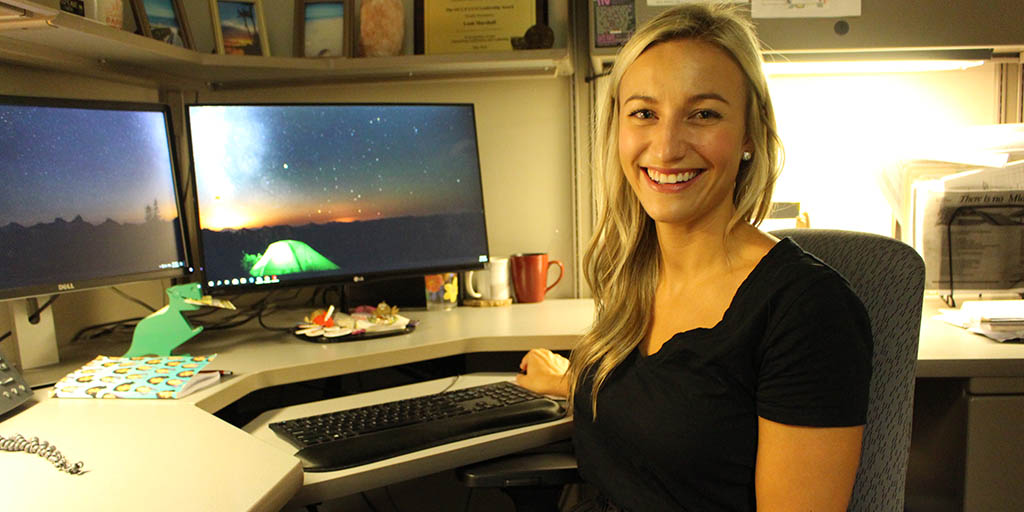Consent 101 with Fanshawe's Sexual Violence Prevention Advisor
 CREDIT: ANGELA MCINNES
CREDIT: ANGELA MCINNESFanshawe's Sexual Violence Prevention Advisor Leah Marshall provides services to any students who have experienced sexual violence.
Consent is a very important conversation to be had with potential sexual partners. However, some may not understand why these conversations are needed, the consequences of not conversing, or even how to bring it up. Interrobang sat down with Leah Marshall, Fanshawe’s Sexual Violence Prevention Advisor, to discuss consent and paint a clearer picture on how to have consensual sex and prevent sexual violence.
Interrobang (?!): What is consent?
Leah Marshall (LM): It’s important for us to have conversations about consent because if we’re comfortable enough to have sex we need to comfortable enough to talk about it. It’s how we understand what our partner wants to but also what they don’t want to do. Consent is an ongoing conversation that happens between two people.
Some of the ways that we can show consent is actually asking our partner for what they want but also through some non-verbal cues. So consent is going to look different for every group that gets together to engage in sexual activity.
?!: How does someone start a conversation about consent?
LM: It starts out being important to know what you want for yourself and what you don’t want for yourself and then having that conversation with your partner. Sometimes we’re having those conversations ahead of time, other times we’re having those conversations in the moment. I think what people can do is check in with their partners and ask ‘is this OK’ or ‘do you want to do this?’ We have to be just as OK with a ‘yes’ as we are with a ‘no’.
?!: What does consent look like?
LM: Consent is going to look different for every interaction as well as for every person we are having an interaction with. In terms of starting that conversation, it’s always important to check throughout the interaction and also read up on people’s cues. If you’re wanting to err on the side of caution, have those conversations ahead of time. That can be done in a way that’s a part of the sexual interaction.
Like, asking people what they like to do or what they like don’t like to do. So, you can get a feel for that. But, it’s important to know just because I say something ahead of time doesn’t mean I can’t change my mind in the moment.
?!: What are some misconceptions about consent?
LM: A common misconception is that just because I was OK with one act maybe when we had sex yesterday, doesn’t necessarily mean that I’m OK with it today. Consent is an ongoing conversation. We need to be aware that people can change their minds and they have a right to change their minds. Just because you’re in a partnership or because you made an agreement and spoken ahead of time, doesn’t mean that someone giving consent cannot change.
It’s important to understand that sexual violence is a spectrum. It isn’t always a forceful violent act. It can actually take place in many different ways.
It’s important to know that no matter how [sexual violence] takes place, the impact on the person is what we need to focus on. Because these types of violence can impact people greatly and it’s important to acknowledge that there are supports for all forms of sexual violence. The way trauma affects people looks different for everyone.
?!: How can we prevent sexual violence?
LM: We can prevent sexual violence by respecting that people have a right to make decisions for their own bodies. Part of combating sexual violence is not just looking at one form of sexual violence, but looking at everything that falls under that umbrella and seeing that as a community. The only way to change that and support one another but also, to acknowledge that when survivors say that they have experienced sexual violence, to believe them.
***
On main campus, Leah Marshall provides services to any students who have experienced sexual violence during their time at Fanshawe or prior to. This service is offered for all forms of sexual violence in a confidential environment. For help or more information, contact Marshall through email lkmarshall@nullFanshawec.ca or set an appointment with Counselling & Accessibility at 519-452-4282.
Anova offers a 24/7 crisis & support line where complete confidentiality is kept and callers can remain anonymous apart from providing a first name. For more information, go to anovafuture.org. Their 24/7 line is 519-642-3000.
The Regional sexual assault and domestic violence treatment centre program at St. Joseph’s Health Care London provides counselling services to anyone who has experienced a sexual assault within the past year. It’s open Monday to Friday from 8 a.m. to 4 p.m. For more information, please visit sjhc.london.on.ca/sexualassault or call 519- 646-6100 x 64224.














